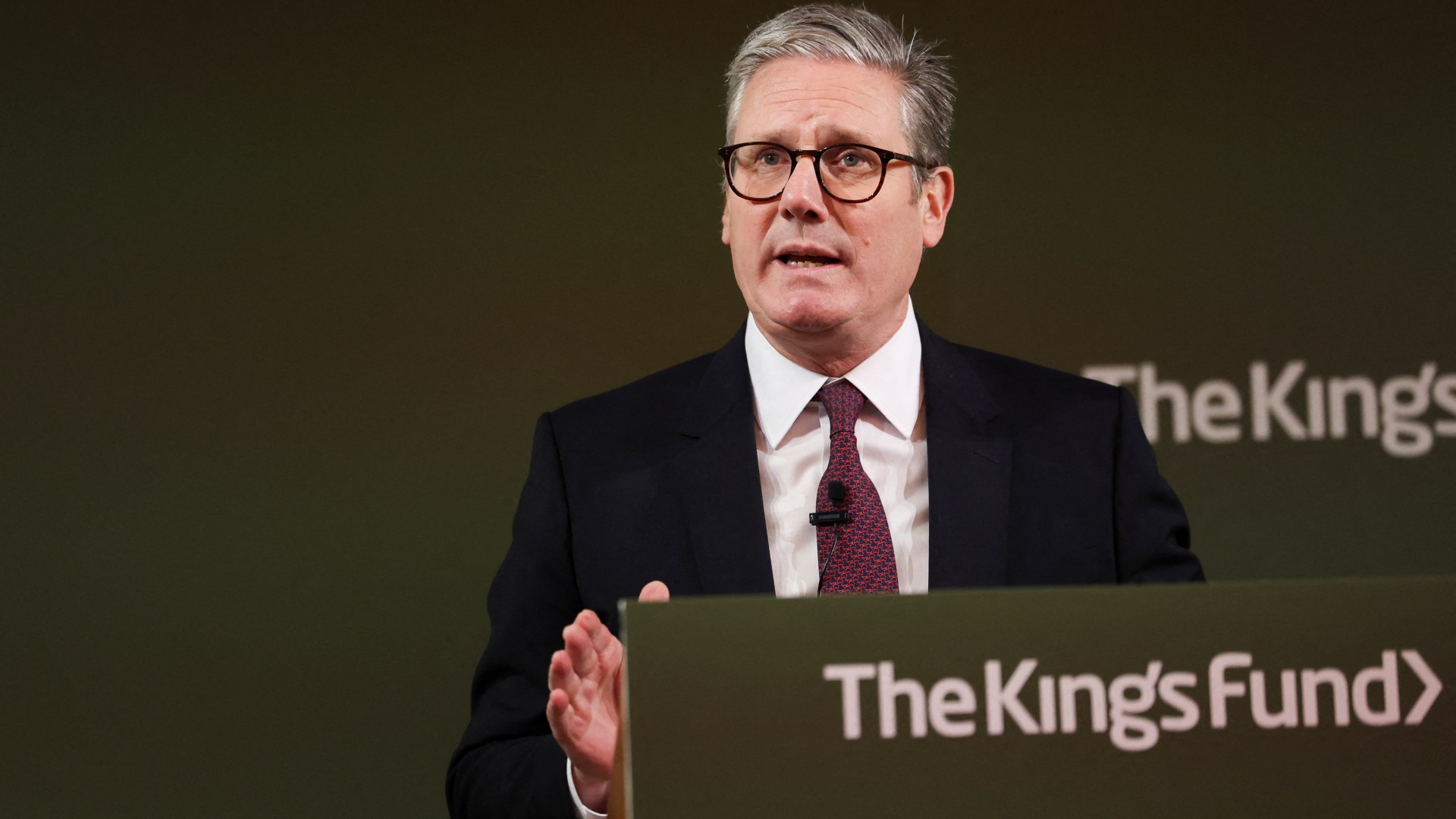SIR Keir Starmer laid bare the nation’s “broken” NHS as he told patients “you have every right to be angry”.
The PM cited figures of delayed routine treatments of thousands of patients in England, claiming they represent “thousands of avoidable deaths” that “could have been saved”.
3

3

3
He said: “Take the waiting times in A&A – more than 100,000 infants waited more than six hours last year. And nearly a tenth of all patients are now waiting for 12 hours or more. That’s not just a source of fear and anxiety, it’s leading to thousands of avoidable deaths.
“That phrase, avoidable deaths should always be chilling … [it means] people’s loved ones who could have been saved, doctors and nurses whose whole vocation is to save them hampered from doing so.”
His comments came as Sir Keir delivered a major speech on NHS reform after an independent review concluded the health service is “in serious trouble”.
Keir’s 10-year plan for the NHS
THE Prime Minister said the Government is working on a 10-year plan to transform the NHS. This includes:
- Digital Transformation: transition to digital healthcare with innovations like fully digital patient records and the NHS app for self-referrals and data transparency.
- Community-Based Care: shift care from hospitals to local communities, increase GP access, and offer virtual consultations and home-based care through virtual wards.
- Prevention Focus: prioritise prevention with NHS health checks, early interventions, and focus on children’s mental health and dental care.
- Integrate Health and Social Care: streamline health and social care to reduce hospital stays and free up resources.
- Workforce Support: end NHS strikes and employ trainee GPs to strengthen the healthcare workforce.
- Long-Term Commitment: a decade-long reform plan to future-proof the NHS.
The Prime Minister insisted the NHS must “reform or die” as he responded to the findings of Lord Darzi’s investigation.
He said: “Public satisfaction in the NHS has fallen from an all time high [under the last Labour government] to an all-time low today.”
Sir Keir went on: “The last government broke the NHS. Until this morning we didn’t know the full-scale of the damage… it is unforgiveable and people have every right to be angry.”
On his plan for healthcare reform, the PM noted he felt a profound responsibility to fix the NHS.
He said: “The NHS may be broken but it is not beaten. As the report says, the NHS may be in a critical condition but it is vital signs are strong and we need to have the courage to deliver long-term reform. Major surgery not sticking plasters.
“We have got to face up to the challenges.”
He added: “The NHS is at a fork in the road and we have a choice about how it should meet those demands. Don’t act and leave it to die. Raise taxes on working people. Or reform to secure its future.
“Working people can’t afford to pay more so it is reform or die.”
The report out today from surgeon Lord Ara Darzi warned the NHS is in critical condition after a decade of “unforgivable” damage.
It said in the best case scenario, the health service will take four years beyond the next election to return to peak performance standards.
Lord Darzi found that A&E queues have exploded in size from an average of less than 40 in April 2009 to more than 100 in the same month this year.
NHS review is shocking – but not surprising
By Sam Blanchard, Health Correspondent
LORD Darzi’s review is shocking but not surprising. It is grim to read all the NHS’s faults and failings in one place but people working in and around the health service knew what it would say long before it was written. Unions and member organisations have been screaming about ‘challenges’ and ‘pressures’ for years, while millions of patients felt the same problems as anger and agony. We already knew patients were waiting too long, dying too soon and crying out for help. So, too, are staff who worked their fingers to the bone through the pandemic thinking things would improve when Covid blew over – only to find better times never came. Two of Lord Darzi’s three main explanations are ‘political choices’ (the Covid pandemic is number three), which gives Labour a free pass to blame the Tories – but Starmer and Streeting must turn bark into bite, and fast. They say they cannot raise taxes for it and any extra cash would risk being taken from budgets needed for Britain’s many other crises, the Health Secretary admitted in a speech last night. Darzi’s review calls for more money for GPs – but overloaded hospitals won’t open their purses. It calls for spending on new technology and modern buildings – but staff will strike again without pay rises. There is no magic money tree and no magic medicine tree, either. Many of the problems are baked in for years to come: we can improve public health and urge Brits to live healthier lifestyles but that could take a generation to have an impact. The diagnosis is as clear as it can be. Any prescription from Labour will anger somebody somewhere, but it must be unflinching and government and the NHS must actually commit to it for a decade or more.
Meanwhile, the UK has higher cancer rates than comparable countries.
No progress was made in diagnosing the disease at stage one between 2013 and 2021.
Lord Darzi blasted the reforms in 2010 spearheaded by Tory Lord Andrew Lansley which infested the NHS with red tape and middle managers, saying it caused “calamitous damage” to the health service.
The peer said: “I have been shocked by what I have found, not just in the health service but in the state of the nation’s health.
“We need to rebalance the system to care in the community rather than adding more staff to hospitals.
“And we need a more honest conversation about performance.”
On Thursday morning, Health Secretary Wes Streeting told BBC Breakfast the NHS could go bust without reform.
“If we don’t grasp both the immediate challenge in front of us and deal with the crisis today, but also prepare the NHS for the challenges of the future in terms of an ageing society and disease and rising costs, rather than a country with an NHS, we’re going to have an NHS with a country attached to it if we’re not careful, and more likely an NHS that goes bust, ” he said.
“That’s not the future we want to see, which is why we’re going to deal with the immediate crisis today, but get the NHS back on its feet and make it fit for the future.”
Professor Kamila Hawthorne, chairwoman of the Royal College of GPs, said: “It makes absolute sense to shift resources into primary care, where patients want to be cared for and where delivering care is most cost effective.”
Conservative shadow health secretary Victoria Atkins said Labour needed to move from rhetoric to action.
The findings of Lord Darzi’s review on the NHS
LORD Darzi’s report sets out how:
– The health of the nation has deteriorated, with more years spent in ill-health. Factors affecting health, such as poor quality housing, low income and insecure employment, “have moved in the wrong direction over the past 15 years, with the result that the NHS has faced rising demand for healthcare from a society in distress”.
– There has been a “surge” in multiple long-term conditions, including a rise in poor mental health among children and young people. Fewer children get their vaccines and fewer adults now participate in things such as breast cancer screening.
– Waiting times targets are being missed across the board, including for surgery, cancer care, A&E and mental health services. The report says “long waits have become normalised” and “A&E is in an awful state”, with long waits likely to be causing an additional 14,000 more deaths a year, according to the Royal College of Emergency Medicine. By April 2024, about one million people were waiting for mental health services. The overall NHS waiting list stands at 7.6 million.
– People are struggling to see their GP. “GPs are seeing more patients than ever before, but with the number of fully qualified GPs relative to the population falling, waiting times are rising and patient satisfaction is at its lowest ever level.”
– Cancer care still lags behind other countries and cancer death rates are higher than in other countries. There was “no progress whatsoever” in diagnosing cancer at stage I and II between 2013 and 2021. However, more recent figures show some improvement.
– Progress in cutting death rates from heart disease has stalled while rapid access to treatment has deteriorated. For example, the time for the highest-risk heart attack patients to have a rapid intervention to unblock an artery has risen by 28% from an average of 114 minutes in 2013-14 to 146 minutes in 2022-23.
– The NHS budget “is not being spent where it should be” and too great a share is being “spent in hospitals, too little in the community, and productivity is too low”. Too many hospital beds are taken up with people needing social care.
– Between 2009 and 2023 the number of nurses working in the community fell by 5%, while the number of health visitors dropped by nearly 20%.
– At the start of 2024, 2.8 million people were economically inactive due to long-term sickness, with most of the rise since the pandemic down to mental health conditions. The report said “being in work is good for wellbeing” and having more people in work grows the economy. “There is therefore a virtuous circle if the NHS can help more people back into work.”
– Raids on capital budgets have left the NHS with crumbling buildings and too many outdated scanners, and “parts of the NHS are yet to enter the digital era”. The report says the “NHS is in the foothills of digital transformation”.
– The NHS delayed, cancelled or postponed far more routine care during the pandemic than any comparable health system.
– Too many NHS staff are “disengaged” and there are “distressingly high-levels of sickness absence”. The pandemic was “exhausting” for many and the result has been a “marked reduction in discretionary effort across all staff groups”.
– Regulatory-type organisations now employ some 7,000 staff, or 35 per NHS provider trust, having doubled in size over the past 20 years.




